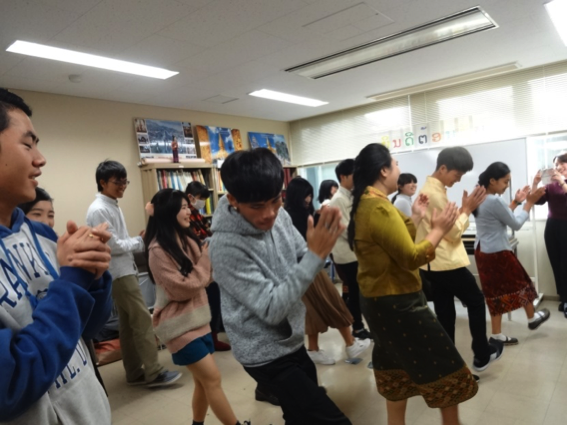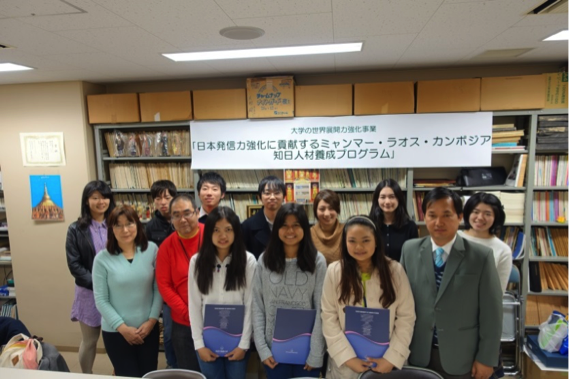Outline
- Purpose of the Program
- Details of the Project
- Partner Universities
- A Message from the Program Leader
- Annual Reports
Purpose of the Program

TUFS dispatches students studying the Burmese, Laotian, and Cambodian languages at TUFS to study at major universities in Myanmar, Laos, and Cambodia. Meanwhile, TUFS will also host students who have an interest in Japan and a strong desire to study Japanese from affiliated universities in these countries. Through a bilateral exchange of students, the program aims to foster Japanese students who are well versed in the three countries and nurture Burmese, Laotian, and Cambodian students who speak Japanese, understand Japanese society, and have the ability to serve as intermediaries between Japan and these regions. It also aims to help cultivate human resources for educating topics related to Japanese society and the Japanese language in Myanmar, Laos, and Cambodia
Details of the Project

The project consists mainly of the following three student exchange programs.
1. Short-Term Joint Education Program
TUFS will organize exchanges of students interested in each other’s regions. These short-term programs will offer joint education and local-language education through intensive curricula lasting roughly two weeks to one month.
2. Long-Term Exchange Program
TUFS will send upper-level (third- and fourth-year) students studying Burmese, Laotian, and Cambodian on one-year programs to their respective countries of study, enabling them to take courses on language, culture, and society together with local students. The students will be required to gain basic knowledge of Japanese-language education before leaving Japan to assist with Japanese-language education at the respective universities as necessary. Meanwhile, TUFS will host a diverse range of students interested in Japan from Myanmar, Laos, and Cambodia and provide them with education on Japan and the Japanese language. The university will also provide incoming exchange students with opportunities for participating in internships and other programs. These offerings will allow the students from the three countries, who have the potential to become human resources for building relationships between Japan and the countries in Southeast Asia, to attain a deeper understanding of Japan.
3. Graduate School-Level Exchange
TUFS will send master’s course students engaged in research on Myanmar, Laos, and Cambodia to their respective countries of study to conduct research in various fields, thereby fostering experts with wide-ranging, firsthand experience. In return, TUFS will admit students from Myanmar, Laos, and Cambodia to the TUFS Graduate School of Global Studies or Joint Education Program as special part-time students. Full-time international students at TUFS will be encouraged to obtain master’s degrees in the fields related to Japanese society and Japanese-language education.
Partner Universities
This program aims to foster Japan specialists in cooperation with TUFS’s long-term partner universities, the University of Yangon, the National University of Laos, and the Royal University of Phnom Penh, which are the top universities in Myanmar, Laos, and Cambodia, respectively. These three universities are expected to grow as key universities in the fields of Japan studies and Japanese-language education in Myanmar, Laos, and Cambodia.
- University of Yangon in Republic of Myanmar
- National University of Laos in Lao P.D.R.
- Royal University of Phnom Penh in Cambodia
A Message from the Program Leader
I am Reiko Suzuki, the leader of the program. Fostering individuals who engage locally in education on topics related to Japanese society and the Japanese language is essential to enhancing Japanese language and Japanese cultural outreach in Southeast Asia. In recent years, it has become imperative to enhance the framework for Japan studies and Japanese-language education in Myanmar, Laos, and Cambodia, where Japan has shown increasing support for exchange programs in multiple fields.
Given this context, we will undertake the program in cooperation with closely related partner universities. By implementing the student exchange program in a continuous, systematic fashion, we will not only strive to nurture educators of Japanese language and topics related to Japanese society who can help train human resources with expertise in Japan but also aim to develop professionals capable of being intermediaries between Japan and the three countries. The program gives students from TUFS, Myanmar, Laos, and Cambodia a valuable pathway toward future success.
TUFS will make every effort to support this project, which we consider critically important for the future of Japan and Southeast Asia. We sincerely appreciate your cooperation with and support of this program.
